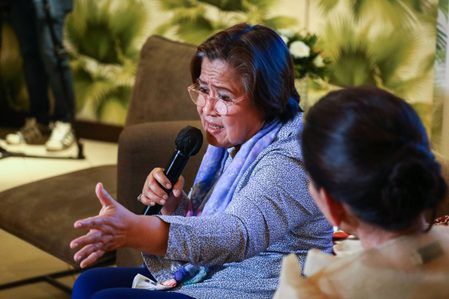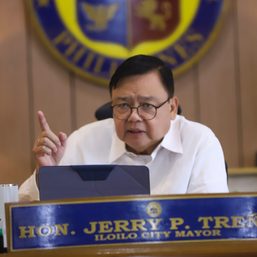SUMMARY
This is AI generated summarization, which may have errors. For context, always refer to the full article.

“They can now enjoy their unmitigated freedom.”
These were the words of Muntinlupa City Regional Trial Court (RTC) Branch 206 Presiding Judge Gener Gito – not reading from his ruling – but a candid remark in open court on Monday, June 24, as his courtroom erupted with claps and cheers.
Judge Gito on Monday acquitted former senator Leila de Lima in her third and last charge of conspiracy to commit drug trading. He is the same judge who granted her bail in November 2023 and set her free after almost seven years in detention.
De Lima is now completely free following the dismissal of all the cases filed during the term of her nemesis, former president Rodrigo Duterte. Also on Monday, Quezon City RTC Branch 76 dismissed a minor disobedience case against De Lima, filed in 2016 by Duterte’s allies in the House of Representatives, for allegedly coercing a witness to ignore the summons by the lower house. This case likewise dragged on for seven years even though a conviction would have amounted to a maximum 6-month sentence only.
No conspiracy
In the last drug case, De Lima filed a demurrer to evidence, which is something that the defense files when it is confident that they can outrightly win a case because the prosecution’s evidence is too weak. Under this option, after the prosecution is done with its presentation of evidence, instead of presenting its own, the defense files a demurrer to cut the trial short and get an outright acquittal.
Judge Gito granted this demurrer for an outright acquittal, reiterating almost all of the same reasons why he granted bail in November – that there was insufficient proof to show conspiracy to commit illegal drug trading. This was originally a charge of committing drug trading, but the prosecution amended their charge midway to connect De Lima to the crime, alleging that as former justice secretary, De Lima enabled the trading in the New Bilibid Prison.
According to the ruling, to prove De Lima’s guilt, the prosecution should have established that:
- Conspiracy existed among all the accused to commit illegal drug trading
- Illegal drug trading was, in fact, committed in the manner alleged
Conspiracy exists when two or more people agreed on the commission of a crime and decided to commit it. In other words, conspiracy “is either a crime in itself or a mere means to commit a crime.”
After “meticulously” analyzing the testimonies of prosecution witnesses, the court said it concluded that the statements were not enough to establish that there was conspiracy among the accused to commit illegal drug trading and that they, in fact, committed illegal drug trading. The court said all the testimonies of the nine witnesses did not prove the conspiracy.
“Their testimonies are marred with incredulities and inconsistencies which affect not only their credibility but also the credulity of their own testimonial stories. Further, their testimonies, if not hearsay, violate the res inter alios rule in evidence. Thus, their testimonies cannot have even a miniscule place in the court of justice,” the court explained. Evidence which falls under the res inter alios rule (a matter between others is not our business) is generally unaccepted in court.
Same witnesses
The court also noted that the same witnesses used by the prosecution were already presented in the two other cases: Criminal Case No. 17-165 and 17-166, where De Lima was already acquitted.
In 2021, Muntinlupa City RTC Branch 205 granted her demurrer, clearing her in Criminal Case No. 17-166, in which she was linked to alleged drug lord Peter Co. In May 2023, Muntinlupa City RTC Branch 204 acquitted her in Criminal Case No. 17-165.
The court said it was “quite perplexing” why the prosecution used the same witnesses in the third case. As witnesses in the last case, they were presented to prove allegations aside from the accusations in the present case. They were also offered to prove conspiracies different from the conspiracy in the last cases, and were previously presented to indict “not entirely the same as those indicted in this case.”
“On the contrary, they [witnesses] even posted more questions than answers to the mind of the Court,” the ruling read.
Colanggo’s testimony
In its decision, the court said Herbert Colanggo, a convicted crime leader and alleged drug lord, was the prosecution’s most important witness. However, just like other witnesses, his testimony was not enough to prove conspiracy. The court said he never mentioned in his testimony that De Lima allegedly ordered him to sell illegal drugs to support her senatorial bid in 2016.
Colanggo also did not mention De Lima’s alleged demand for a “payola” (demand money) of P3 million a month from the alleged illegal drug trade. The court said the proposal to trade illegal drugs did not come from De Lima, but rather from drug convict Jaybee Sebastian, based on Colanggo’s testimony. Sebastian died in July 2020 reportedly from COVID-19 and was immediately cremated.
It was Sebastian who suggested to Colanggo to allegedly consolidate their operation for De Lima’s senatorial run. However, this statement from Sebastian cannot be used against De Lima because it’s not factual, but rather hearsay.
“Colanggo’s testimony cannot be used to prove the truth of Sebastian’s statement. While it may be admitted proving the fact that it was uttered or stated by Sebastian, the admission will only be limited to the fact that it was stated or spoken, but not to prove the truth of the matter asserted by the statement,” the court said.
In addition, the court said Sebastian was the only one “who was proven to have committed illegal drug trading.” But the “evidential link” between Sebastian and De Lima, including other accused, was not satisfactorily established.
What’s next for the prosecution?
Prosecutor Sonny Ocampo, who’s in charge of the De Lima case, said the prosecution is still contemplating if they will file a motion for reconsideration.
“We’re also very happy for the good senator because once upon a time, she was our former boss. And we do not lose our respect even though we are on the other side of the fence, but it is our duty to prosecute,” Ocampo added.
Generally, an acquittal cannot be appealed as it would amount to double jeopardy, unless the prosecution can prove there was a mistrial. This has been reiterated by courts in several decisions, such as in Nobel Peace Prize laureate and Rappler CEO Maria Ressa and Rappler’s acquittal in their tax case. The court, in that ruling, mentioned the case of Lejano vs. People, which says that to reconsider an acquittal means putting the accused twice in jeopardy of being punished for the crime he/she has already been acquitted of.
But this adjudication did not stop the Office of the Solicitor General from appealing De Lima’s acquittal last year. After De Lima’s second acquittal, Solicitor General Menardo Guevarra said they filed a petition for certiorari, not an appeal, “with the Court of Appeals on the ground of grave abuse of discretion amounting to lack or excess of jurisdiction on the part of the trial court judge.”
The appeal is still pending. – Rappler.com
Add a comment
How does this make you feel?

![[Rappler Investigates] When China, Leila, Sara conspire](https://www.rappler.com/tachyon/2024/06/saraduterte-west-ph-sea-leila-de-lima-newsletter-june-27-2024.jpg?resize=257%2C257&crop=279px%2C0px%2C720px%2C720px)








There are no comments yet. Add your comment to start the conversation.